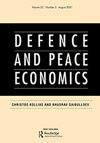瑞典基本安全利益部分战略自治的演变
IF 1.6
3区 经济学
Q2 ECONOMICS
引用次数: 2
摘要
本文描述了瑞典如何发展一个混合国防工业基础设施,其中三个优先考虑的“基本战略利益”指向国内国防工业的部分:“部分战略自治”。文章重点论述了瑞典宣称的三大基本安全利益——作战飞机能力;水下功能;以及指挥、控制、通信和情报领域(C3I)的完整性关键部分。文章发现,基本安全利益的可能性和前进道路各不相同,总的趋势是更多的共享和越来越多的部分自治。六个变化因素被制定为驱动瑞典今天的部分战略自治:自治是国际化失败的结果;对瑞典的技术民族主义看法导致工业保护主义;战略选择;企业游说;出口激励导致对技术的政治支持;以及欧盟国防工业的欧洲化。技术民族主义和战略选择是影响最明显的因素。国防工业的整体治理明确了确保供应安全的优先事项和对三大基本安全利益的高度自治。国防工业的其他部分在全球化和更具竞争力的条件下运作。为了实行更多的经济理性和争取共同自治,瑞典必须增加其对多边武器合作的参与。本文章由计算机程序翻译,如有差异,请以英文原文为准。
The Evolution Towards the Partial Strategic Autonomy of Sweden’s Essential Security Interests
ABSTRACT This article describes how Sweden developed a hybrid defence-industrial infrastructure with three prioritized ‘essential strategic interests’ pointing to parts of the domestic defence industry: ‘a partial strategic autonomy’. The article focuses on Sweden’s declared three essential security interests – combat aircraft capability; underwater capabilities; and integrity-critical parts of the command, control, communication and intelligence domain (C3I). The article finds that the possibilities and ways forward for the essential security interests vary, with a general trend towards more shared and increasingly partial autonomy. Six change factors are formulated as drivers towards Sweden’s partial strategic autonomy of today: Autonomy as a result of failed internationalization; Techno-nationalist perception of Sweden leading to industrial protectionism; Strategic choice; Corporate lobbying; Export incentives leading to political support of technologies; and Europeanization of the EU defence industry. Techno-nationalism and strategic choice are the factors with the most evident impact. The overall governance of the defence industry is clear on the priority of ensuring security of supply and a high degree of autonomy regarding the three essential security interests. Other parts of the defence industry operate under globalized and more competitive conditions. In order to apply increased economic rationality and strive for shared autonomy, Sweden must increase its engagement in multilateral arms collaboration.
求助全文
通过发布文献求助,成功后即可免费获取论文全文。
去求助
来源期刊

Defence and Peace Economics
ECONOMICS-
CiteScore
4.00
自引率
18.80%
发文量
45
期刊介绍:
Defence and Peace Economics embraces all aspects of the economics of defence, disarmament, conversion and peace. Examples include the study of alliances and burden-sharing; military spending in developed and developing nations; arms races; terrorism; country surveys; the impact of disarmament on employment and unemployment; the prospects for conversion and the role of public policy in assisting the transition; the costs and benefits of arms control regimes; the arms trade; economic sanctions; the role of the United Nations.
 求助内容:
求助内容: 应助结果提醒方式:
应助结果提醒方式:


